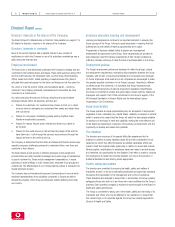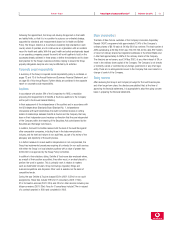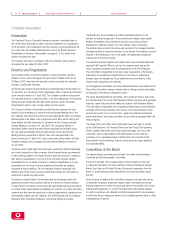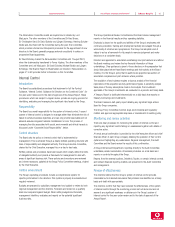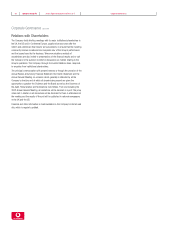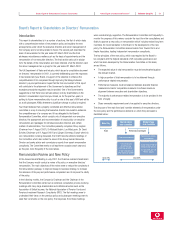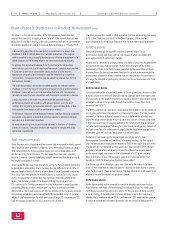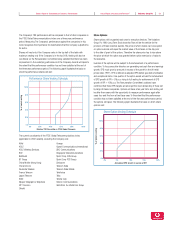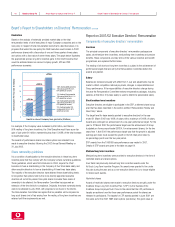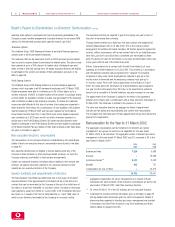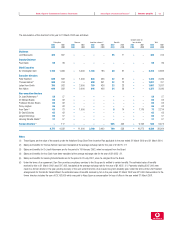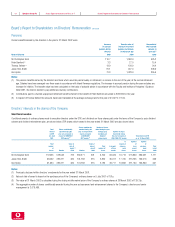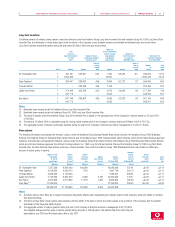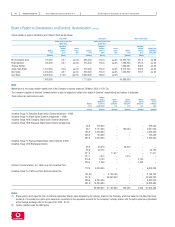Vodafone 2002 Annual Report Download - page 59
Download and view the complete annual report
Please find page 59 of the 2002 Vodafone annual report below. You can navigate through the pages in the report by either clicking on the pages listed below, or by using the keyword search tool below to find specific information within the annual report.
Board’s Report to Shareholders on Directors’ Remuneration Vodafone Group Plc 57Annual Report & Accounts and Form 20-F
Board’s Report to Shareholders on Directors’ Remuneration
Introduction
This report to shareholders is in a number of sections, the first of which deals
with a comprehensive review of remuneration policy and explains the new
arrangements under which the executive directors and senior management of
the Company are to be remunerated in future. The second part describes the
basis of remuneration for the year ended 31 March 2002 and the third
addresses miscellaneous matters such as the basis of appointments and the
remuneration of non-executive directors. The final section sets out in tabular
form the details of the remuneration and share interests of all the directors (and
the senior management as a group) for the year ended 31 March 2002.
The UK Department of Trade and Industry, which issued a consultative document
on directors’ remuneration in 2001, is currently deliberating upon the responses
it has received and your Board, in support of the objective to enhance the
competitiveness of UK companies through improving the linkage between
directors’ pay and performance, hopes that the form and content of this report
will contribute to the attainment of the Government’s objectives and that
excessive prescriptive regulation may be avoided. One of the Government’s
suggestions is that there be an annual advisory vote by shareholders on the
directors’ remuneration report and your Board, as for the past two years, is
putting its future remuneration policy to such a vote at this year’s AGM and will do
so at all subsequent AGMs whenever a significant change to policy is required.
Your Board believes that a properly constituted and effective remuneration
committee is a key to ensuring that executive director remuneration enhances
the competitiveness of a company and it has delegated to the Board’s
Remuneration Committee, which consists only of independent non-executive
directors, the assessment and recommendation of broad policy on executive
remuneration and packages for individual executive directors and certain
matters of administration. The Committee presently comprises Penny Hughes
(Chairman from 1 August 2001), Dr Michael Boskin, Lord MacLaurin, Sir David
Scholey (Chairman until 1 August 2001) and Jürgen Schrempp. Except when his
own remuneration is being discussed, the Chief Executive attends meetings of
the Committee, which also invites the views of the Group Human Resources
Director and seeks advice and commissions reports from expert remuneration
consultants. The Committee meets on at least three occasions each year and,
as this year, more frequently if the need arises.
Remuneration Review and New Policy
At the Annual General Meeting in July 2001, the Chairman advised shareholders
that the Company would conduct a review of its policy on executive directors’
remuneration. The main objectives of the review were to reduce the complexity of
the remuneration package, to improve linkage to business strategy, to increase
the relevance of the pay and performance comparators and to improve the clarity
of the policy.
In the following months, the Company’s Chairman and the Chairman of the
Remuneration Committee carried out an extensive consultation process involving
meetings with many large shareholders and institutional bodies such as the
Association of British Insurers, the National Association of Pension Funds and
Pensions Investment Research Consultants (PIRC). The first meetings were to
understand their views on the previous policy and subsequent meetings were to
seek their comments on the new policy. The responses from these meetings
were overwhelmingly supportive. The Remuneration Committee met frequently to
monitor the progress of this review, consider the input from the consultations and
finally to approve a new policy on remuneration which includes revised long term
incentives for recommendation to the Board. In the development of the new
policy, the Remuneration Committee received advice from Towers Perrin and
Kepler Associates, leading independent remuneration consultants.
The key principles of the new policy, which was required by the Board to
be compliant with the highest standards of UK corporate governance and
which has been developed by the Remuneration Committee on this basis,
are as follows.
•The expected value of total remuneration must be benchmarked against
the relevant market.
•A high proportion of total remuneration is to be delivered through
performance-related remuneration.
•Performance measures must be balanced between absolute financial
measures and sector comparative measures to achieve maximum
alignment between executive and shareholder objectives.
• The majority of performance-related remuneration is to be provided in the
form of equity.
•Share ownership requirements are to be applied to executive directors.
The structure of the main fixed and incentive elements of remuneration under
the new policy and the performance elements on which they are based is
illustrated below:
Base Pay Short/medium
term incentive
Deferred
share bonus
1-year measures
of EBITDA, free
cash flow & ARPU+
2-year measures of
EPS relative to UK RPI
3-year relative TSR for
Performance shares
3-5 year EPS over UK
RPI for options
Performance shares+
share options
Performance ContingentFixed
Circa 20% Circa 80%
Medium/long
term incentive







